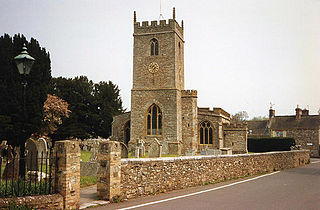
Trull is a village, electoral ward and civil parish in Somerset, England, situated near Taunton. The parish which includes Dipford has a population of 2,288.

St Wilfrid's Church is in Church Lane, Grappenhall, a village in Warrington, Cheshire, England. It is designated by Historic England as a Grade I listed building. It is an active Anglican parish church in the diocese of Chester, the archdeaconry of Chester and the deanery of Great Budworth.
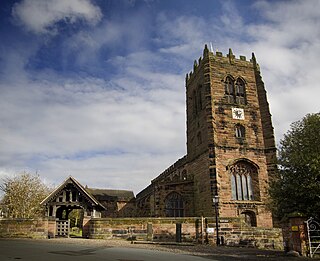
St Mary and All Saints Church is in the centre of the village of Great Budworth, Cheshire, England. It is an active Anglican parish church in the diocese of Chester, the archdeaconry of Chester and the deanery of Great Budworth. The church is recorded in the National Heritage List for England as a designated Grade I listed building. Clifton-Taylor includes it in his list of 'best' English parish churches. Richards describes it as "one of the finest examples of ecclesiastical architecture remaining in Cheshire". The authors of the Buildings of England series express the opinion that it is "one of the most satisfactory Perpendicular churches of Cheshire and its setting brings its qualities out to perfection".

The parish Church of St. Quiricus and St. Julietta in Tickenham, Somerset, England, has 11th-century origins, with the nave and chancel being extended by the addition of aisles and the south chapel in the early 13th century. It has been designated as a Grade I listed building.
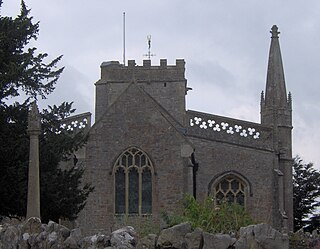
The Church of the Holy Trinity in Burrington, Somerset, England, is from the 15th century and was restored in 1884. It is a Grade I listed building.

The Church of All Saints in Monksilver, Somerset, England dates from the 12th century and has been designated by English Heritage as a Grade I listed building. The church has a square west tower, built in the 14th century,

The Church of St Mary in Kingston St Mary, Somerset, England, dates from the 13th century and has been designated as a Grade I listed building.

The Church of St Peter & St Paul in North Curry, Somerset, England, is nicknamed ‘The Cathedral of the Moors’. It dates from the 14th century and has been designated a Grade I listed building.
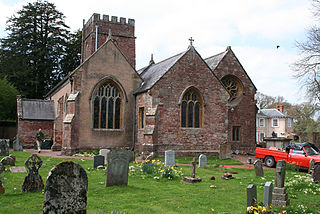
The 'Church of All Saints in Nynehead, Somerset, England dates from the 14th century and has been designated as a Grade I listed building.

The Church of St Gregory Stoke St Gregory, is a Church of England parish church in Somerset, England. Its parish is part of the Athelney Benefice, along with the parishes of St Michael, Burrowbridge, St Bartholomew, Lyng and SS Peter and Paul, North Curry.

The Church of St Peter & St Paul in Combe Florey, Somerset, England has some remains from the 13th century but is mostly from the 15th century and is designated as a Grade I listed building.

The Church of St Michael in Milverton, Somerset, England dates from the 13th century, on the site of an even earlier chapel, and has been designated as a Grade I listed building.

The Church of St Andrew & St Mary in Pitminster, Somerset, England was built around 1300 and has been designated as a Grade I listed building.
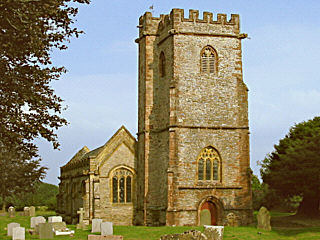
The Church of St Mary & All Saints in Broomfield, Somerset, England was built in the 15th and 16th centuries and has been designated as a Grade I listed building.

The Church of Saint Andrew is an Anglican parish church located on Turnhill Road, in High Ham, Somerset, England. It shows evidence of 12th- and 14th-century building and was largely rebuilt in 1476. On 17 April 1959, it was designated as a Grade I listed building.

The Church of St James is a Church of England parish church in Taunton, Somerset, England. It dates from the early 14th century, although an earlier church, associated with Taunton Priory, was located on the same site in the 10th century. The church is dedicated to St. James the Greater. It is a Grade II* listed building.

St James' Church is in the village of Brindle, Lancashire, England. It is an active Anglican parish church in the deanery of Chorley, the archdeaconry of Blackburn, and the diocese of Blackburn. The church is recorded in the National Heritage List for England as a designated Grade II listed building.

The Church of All Saints is an Anglican church in Norton Fitzwarren, Somerset, England, which dates from the late 13th or early 14th century. It is located in the deanery of Taunton, within the diocese of Bath and Wells. It is a Grade II* listed building.

The Church of St George is a Roman Catholic church in Taunton, Somerset, which dates from the mid-19th century. It was the second Catholic church to be built in Taunton after the Reformation, replacing the much smaller St George's Chapel. The main church building is designated by Historic England as a Grade II* listed building, while the rectory is Grade II listed.

The Anglican Church of St Michael in Angersleigh, Somerset, England was built in the 14th century. It is a Grade II* listed building.





















